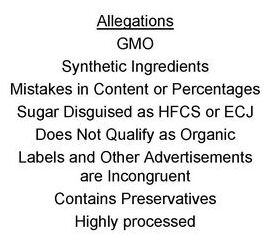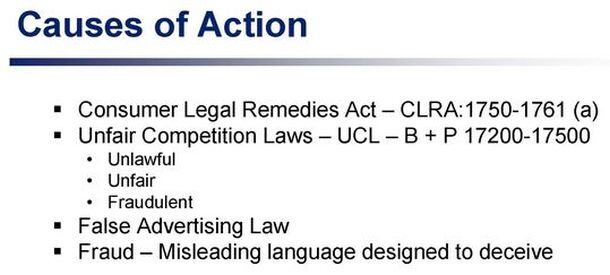Speaking at the event, hosted by the State Bar of California’s Food Law Committee, Robert S. Niemann, a partner at Keller and Heckman LLP, said more than half of these cases - many of which are about ‘all-natural’ claims - were filed in California.
And of these, the vast majority were filed in the Northern District, which has earned the nickname ‘the food court’ (although Florida and New York are also popular places to file).
He added: “In fact there are more dismissals than there are settlements, and in the 25 we’ve looked at the dollar ranges are all over the place, from $15,000 to $9m.
“Some have offered money to the plaintiffs, but some have offered no [monetary] relief to the class, only injunctive relief [eg. where the company agrees to change its labels/marketing] and attorneys’ fees.”
Firms defending themselves against such cases – which typically allege breaches of consumer protection laws among other things – have employed a range of strategies from pre-emption (federal law takes precedence), to primary jurisdiction (this is a matter for the FDA, not the courts), and lack of standing (do all members of the proposed class have standing to pursue claims as well as the plaintiff?).
Saying it’s unlawful therefore I win, that’s not enough
However, what often happens is that motions to dismiss are granted in part and denied in part, and it’s rare that food companies can claim a complete victory at this stage in a case.

In the cases where a class is certified, meanwhile, defendants typically choose to settle rather than see a case go any further.
In general, however, plaintiffs “must show that the product would not have been purchased ‘but for’ the allegedly false and misleading statements”, said Rob Bader, a counsel in Goodwin Procter’s litigation department.
“You must prove that the plaintiff knew he or she was being misled at the point of purchase, you must plead and prove injury from actual reliance on false and misleading statements… Saying, 'It’s unlawful therefore I win,' that’s not enough.”
And even if the Food & Drug Administration (FDA) were to define natural, he said, “A consumer must still show evidence that a substantial number of consumers were actually deceived. The fact that the plaintiff himself was deceived, that’s not enough.”
An FDA warning letter is nice but it won’t show deception
Steve Gardner, who heads the food law practice at the Stanley Law Group of Dallas, Texas, and was formerly director of litigation at consumer advocacy group The Center for Science in the Public Interest (where he sued a number of high-profile food & beverage brands), added:
“When you get to the summary judgment stage you better have good evidence of widespread consumer deception… An FDA warning letter is nice but it won’t show deception.”

But while Gardner has sued scores of food & beverage companies over allegedly deceptive labeling and advertising, not all cases are worth bringing, he said: “I’ve seen cases lost where people bring complaints that are legally and factually cognizable, but are stupid… and should never have been brought.
"A lot of the cases fail because the complaints over reach.”
‘Companies are calling what is basically sugar ‘evaporated cane juice’ because people will think it’s healthier than sugar. It aint, but it sounds better’
Judges will weigh up the legal arguments, he said, “but they are humans too... and where cases involve a clear deception they will likely survive more often.”
And some labeling practices are “truly intentionally deceptive”, he claimed. “One of the more cynical practices I have ever seen is where companies are calling what is basically sugar ‘evaporated cane juice’ because people will think it’s healthier than sugar. It ain't, but it sounds better.” (Click HERE to get an alternative perspective from food companies using the term.)
On GMOs, which have been the subject of scores of lawsuits over ‘all-natural’ claims, Gardner said: “Virtually no one considers GMOs to be natural except for the food companies [click HERE].”

And to those arguing that the term ‘natural’ is so subjective that trying to define it in relation to food would be well-nigh impossible, said Gardner: “Just pick up the dictionary and look it up…”
When does a process render a product ‘not natural?’ At what point is the line drawn in the sand?
However, Angela Diesch, a shareholder in the Roseville, CA, office of Kronick, Moskovitz, Tiedemann & Girard, said that just because USDA had come up with a definition of 'natural' covering meat and other products that are ‘minimally processed’ did not mean it was a simple matter for the FDA or the FTC.
Almost all foods have undergone processing of some sort, she added: “You can’t walk into a garden and pick up a potato chip… There are so many issues involved; for example how much and what type of processing is OK?

“Some chemical processes are quite natural like fermentation, but what about other processes like solvent extraction, hydrogenation, crystallization, I could go on and on. Who is to decide at what point in those processes is the line drawn in the sand?”
Just because it’s allowed in organic foods doesn’t mean you can call it ‘natural’
Meanwhile, just because some synthetic ingredients such as the leavening agent Sodium acid pyrophosphate (SAPP) are approved for use in organic products doesn’t necessarily mean you can call these products ‘all-natural’ or say they contain 'nothing artificial', she added, although this is still being debated in the courts (click HERE to read about lawsuits addressing this issue).

LEGAL VOX POP: Are 'all-natural' claims worth the hassle?
INDUSTRY VOX POP: Do natural claims still resonate with consumers?

